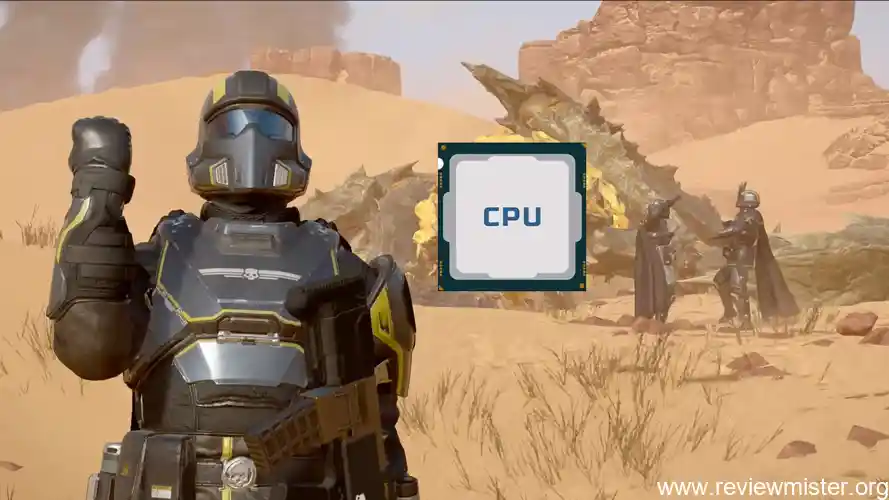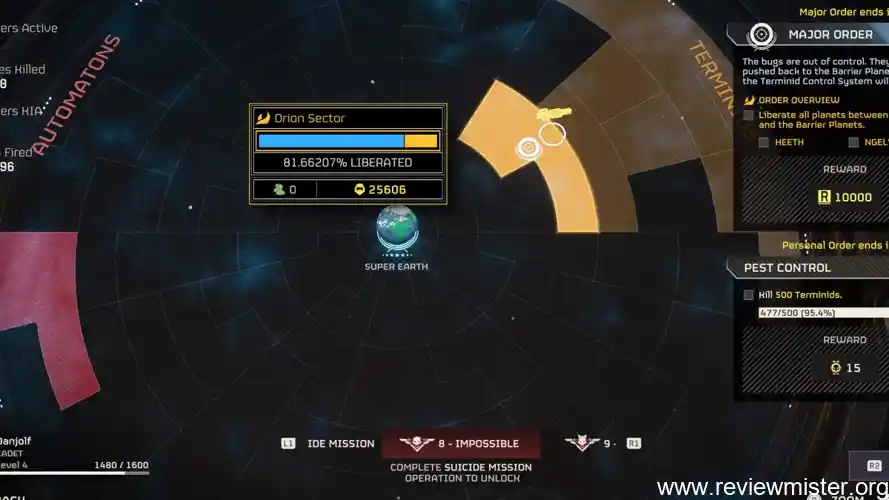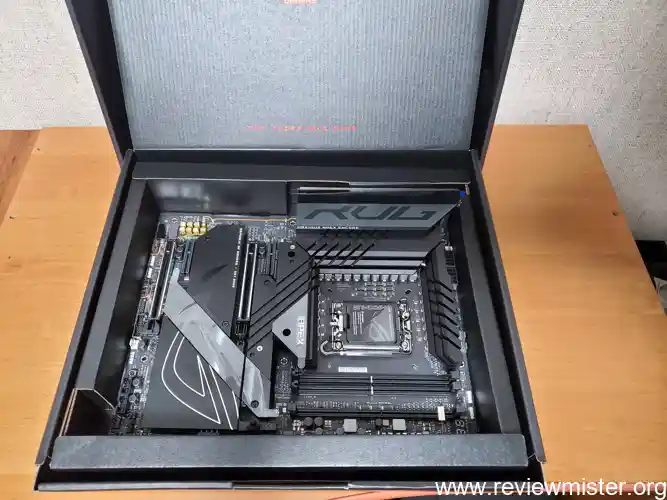If you’ve been playing Helldivers 2 and noticed your frame rates dropping or gameplay becoming choppy, you’re not alone. Many players, myself included, have run into performance issues that are often tied to what’s known as a CPU bottleneck. This is especially relevant in a game like Helldivers 2, where large-scale battles, complex AI, and intense physics calculations put a heavy load on your processor. Understanding how your CPU impacts your gaming experience can make a huge difference—not just in smooth gameplay, but also in how you approach upgrades or tweak your system settings. In this article, I’ll walk you through exactly what a CPU bottleneck is in the context of Helldivers 2, how to spot the signs, and what steps you can take to get the most out of your current hardware. Whether you’re troubleshooting stutters or just want to make sure your rig is ready for the next mission, this is where you’ll find the answers you need to keep your gameplay running at its best.
What Is a CPU Bottleneck in Helldivers 2?

If you’ve ever noticed Helldivers 2 running sluggish or your frame rates dipping for no clear reason, you might be running into a Helldivers 2 CPU bottleneck. This means your processor just can’t keep up with everything the game is throwing at it, even if your graphics card is more than capable. Think of your CPU as the traffic cop, coordinating all the action—if it gets overwhelmed, the whole system slows down, no matter how powerful your GPU is. So, if you’re seeing lag or hitching in the middle of chaos, your CPU is likely the culprit.
Definition of CPU bottleneck in PC gaming
When we talk about a Helldivers 2 CPU bottleneck, we’re looking at a scenario where your processor is struggling to keep up with the demands of the game, even if your graphics card has plenty of power left unused. You’ll notice your frame rates dip or the gameplay feels choppy, not because your GPU is slacking, but because your CPU can’t process game logic, AI, and physics fast enough. Think of it like trying to pour water through a funnel—the funnel (your CPU) can only handle so much at a time, no matter how much water (data) you have waiting. If you notice your CPU running at 100% while your GPU is underutilized, you’re likely hitting this bottleneck.
CPU vs. GPU load in Helldivers 2
If you’ve ever wondered why your frame rates in Helldivers 2 suddenly tank, even though your graphics card isn’t breaking a sweat, you might be dealing with a Helldivers 2 CPU bottleneck. Basically, this happens when your processor can’t keep up with the demands of the game, causing it to max out while your GPU just idles along. You’ll notice your CPU usage spiking to 100% while your GPU usage stays low. It’s like trying to pour a gallon of water through a straw—no matter how strong your graphics card is, the CPU limits how much data can flow, slowing everything down.
Common indicators of CPU bottlenecks
When we talk about a Helldivers 2 CPU bottleneck, we’re really talking about your processor holding back your gaming experience. Instead of your graphics card being the weak link, your CPU ends up working overtime while your GPU just waits around. You’ll notice this when your frame rates drop, the game stutters, or things just don’t feel smooth—especially during hectic battles or when lots of enemies fill the screen. It’s like trying to pour a gallon of water through a straw: no matter how fast the rest of your system is, your CPU sets the pace, and if it can’t keep up, your whole game slows down.
Which CPUs Are Most Affected by Bottlenecks in Helldivers 2?

If you’re wondering which CPUs struggle the most with a Helldivers 2 CPU bottleneck, let me tell you—it’s usually the older or lower-end processors that get left behind. You’ll notice more issues if your setup has fewer cores or lower clock speeds, especially when the action heats up on screen. I’ve seen both budget Intel and AMD chips start to sweat, especially during intense co-op missions where enemy AI and physics go wild. If you want smoother performance, you need a CPU that can keep up with all the chaos Helldivers 2 throws at us.
Minimum and recommended CPU specifications
If you’re running into helldivers 2 cpu bottleneck issues, you’ll notice that older or entry-level CPUs—like Intel’s i3 and some early Ryzen 3 or 5 chips—struggle the most. This is especially true if you’re gaming on quad-core processors or anything with lower clock speeds. Helldivers 2 leans heavily on both core count and single-threaded performance, so if your CPU is a few generations behind or lacks six or more cores, you’re likely to see stutters and frame drops even with a strong GPU. You and I both know: your CPU can be the party pooper if it’s not keeping up!
Performance benchmarks for Intel and AMD CPUs
If you’re running into a Helldivers 2 CPU bottleneck, you’ll notice that older or entry-level CPUs struggle the most. Chips with fewer cores or lower clock speeds—think older Intel i5 or AMD Ryzen 3 models—often can’t keep up when Helldivers 2 throws lots of enemies, physics, and effects at you. Even some mid-range processors can show their age, especially in intense multiplayer moments. On the flip side, modern CPUs with at least 6 cores and higher frequencies handle the workload far better, letting your GPU really flex its muscles. So, if you’re seeing stutters, your processor might just be the culprit.
Impact of core count and clock speed
If you’re noticing a Helldivers 2 CPU bottleneck, the type of processor you’re running plays a huge role. Lower-end or older CPUs, especially those with fewer cores or lower clock speeds, tend to struggle most. If you’re using something like an Intel i5 from several generations back or an entry-level AMD Ryzen chip, you’ll probably hit performance walls faster, especially when the game gets hectic. On the other hand, modern multi-core processors from Intel and AMD handle the workload much better. Essentially, the more cores and speed you have, the less likely you’ll be held back by your CPU.
What Are the Symptoms of a CPU Bottleneck in Helldivers 2?
If you’ve ever felt your gameplay in Helldivers 2 suddenly getting choppy or watched your frame rates nosedive right in the middle of chaotic firefights, you might be dealing with a classic Helldivers 2 CPU bottleneck. You’ll notice things like stuttering, slow response times, or your graphics card twiddling its thumbs while your processor struggles to keep up. It’s almost like your CPU is the bottleneck in a busy kitchen, slowing down the whole meal even though your GPU is ready to serve. If you spot these symptoms, there’s a good chance your CPU just can’t keep pace with the demands of the game.
Frame rate drops and stuttering analysis
If you’re running into a Helldivers 2 CPU bottleneck, you’ll probably notice your frame rate dropping even when your graphics card isn’t maxed out. It’s like your computer’s brain is stuck in traffic—everything slows down, especially during chaotic battles or when there are lots of enemies on screen. You might see stuttering, input lag, or your CPU usage spiking to 100% while your GPU just coasts along. Sometimes, your game will hitch or freeze for a split second, which can be super frustrating. If this sounds familiar, your CPU is likely the weak link holding your Helldivers 2 experience back.
CPU and GPU usage monitoring
If you’re dealing with a Helldivers 2 CPU bottleneck, you’ll notice a few telltale signs while playing. Your frame rate might dip unexpectedly, especially during intense battles or when there’s a lot happening on screen. You could experience stuttering—those annoying micro-pauses that break the flow of gameplay. Often, you’ll see your CPU usage stuck at or near 100%, while your GPU isn’t working nearly as hard. Sometimes, it’s more obvious in multiplayer matches, where extra chaos puts even more strain on your processor. If this sounds familiar, you’re likely running into a classic CPU bottleneck in Helldivers 2.
Comparison of single-player vs. multiplayer performance
If you’re running into a Helldivers 2 CPU bottleneck, you’ll notice it in a few frustrating ways. First, your frame rate might drop for no obvious reason, even though your graphics card isn’t working that hard. You might also see stuttering or hitching, especially in big battles or crowded multiplayer lobbies. Checking your resource usage, you’ll spot your CPU maxing out while your GPU sits idle. If your experience is smooth in single-player but choppy in co-op, that’s another sign your processor can’t keep up. Watching for these clues can help you figure out if the CPU is holding you back.
How Do In-Game Settings Affect CPU Bottlenecks in Helldivers 2?
If you’ve ever tweaked your graphics settings in Helldivers 2 hoping for smoother gameplay, you might’ve noticed that not every change gives you the boost you expect—especially if you’re dealing with a Helldivers 2 CPU bottleneck. Some settings, like resolution and texture quality, mainly lean on your GPU, but others—think physics, crowd density, or enemy AI—can pile extra work onto your CPU. When you crank up these CPU-heavy options, you might see more stuttering or slower frame rates, even if your graphics card is chilling. It’s all about finding the right balance so your processor isn’t left gasping for air while you’re fighting bugs and bots.
Effect of resolution and graphics settings
When you tweak your in-game settings in Helldivers 2, you’re directly impacting how much work your CPU has to do. Lowering things like crowd density, physics effects, or AI complexity can really lighten the load on your processor, which helps if you’re hitting a Helldivers 2 CPU bottleneck. On the flip side, cranking up these settings means your CPU is juggling more calculations—think of it like trying to keep too many plates spinning at once. If you notice stuttering or frame drops, try dialing back those CPU-heavy settings first before messing with graphics options that mainly affect your GPU.
Physics, AI, and simulation load on the CPU
When you tweak in-game settings in Helldivers 2, you’re actually deciding how much work your CPU has to juggle. If you crank up options like physics, crowd density, or AI complexity, your processor might sweat bullets trying to keep up, leading to a Helldivers 2 CPU bottleneck. On the flip side, lowering these settings takes some heat off your CPU, letting your graphics card do more of the heavy lifting. It’s a bit like asking your brain to solve a bunch of puzzles at once—the harder the puzzles, the more likely you’ll get stuck. Finding that sweet spot in settings can seriously smooth out your gameplay.
Performance scaling with different settings
If you’re running into a Helldivers 2 CPU bottleneck, tweaking your in-game settings can make a world of difference. Lowering certain options—like crowd density, physics detail, or the number of active AI—takes a lot of stress off your processor. You might think bumping down resolution will help, but in reality, that mostly affects your GPU, not your CPU. Focus instead on settings that impact simulation and background tasks. Sometimes, just turning down a couple of CPU-heavy features can smooth out stutters and give you steadier frame rates, especially during chaotic moments with tons of enemies on screen.
How to Diagnose and Measure CPU Bottleneck in Helldivers 2?
If you’re worried that Helldivers 2 just isn’t running as smoothly as you’d like, figuring out whether you’re hitting a CPU bottleneck is the first step. I’ve found it’s easier than you think—by keeping an eye on your CPU and GPU usage while you play, you can spot if your processor is maxing out while your graphics card sits idle. If frame drops or stuttering happen when there’s a lot going on, that’s usually your CPU crying for help. To get a clear picture, you and I can use real-time monitoring tools, dig into frame times, and see exactly where your system is struggling.
Tools for real-time CPU and GPU monitoring
If you suspect a Helldivers 2 CPU bottleneck, figuring it out is pretty straightforward with the right approach. Start by running an in-game scenario while keeping an eye on your CPU and GPU usage using tools like MSI Afterburner or Windows Task Manager. If you notice your CPU is consistently maxed out (close to 100%) while your GPU has room to spare, that’s a classic sign of a bottleneck. You might also spot uneven frame times or sudden drops in performance, especially in chaotic scenes. Compare your single-player and multiplayer stats—multiplayer usually puts even more strain on the CPU.
Interpreting frame times and usage graphs
If you suspect a Helldivers 2 CPU bottleneck is holding back your gameplay, the first thing you’ll want to do is monitor your hardware in real time. Use tools like MSI Afterburner or HWMonitor to keep an eye on both CPU and GPU usage while you play. If your CPU is constantly hitting 90-100% while your GPU sits idle, that’s a classic sign you’re bottlenecked by your processor. You can also check your frame times—if they’re inconsistent or spiking, it usually points to your CPU struggling to keep up, especially in chaotic scenes. Don’t forget to compare results in single-player and multiplayer, since CPU demands can jump in co-op sessions.
Benchmarks and stress test methodology
If you’re wondering whether you’re running into a Helldivers 2 CPU bottleneck, you’ll want to keep an eye on a few key metrics while playing. Start by monitoring your CPU and GPU usage with tools like MSI Afterburner or Task Manager—if your CPU is constantly maxed out while your GPU is chilling, that’s a classic sign. Watch for frame time spikes or stuttering, especially when lots of enemies or effects appear on screen. Comparing performance in single-player versus multiplayer can also reveal bottlenecks, since extra players and AI usually add more stress to your processor. This hands-on approach helps pinpoint exactly where things go sideways.
What Solutions Reduce CPU Bottleneck in Helldivers 2?
If you’re dealing with a Helldivers 2 CPU bottleneck, you’re probably frustrated by those annoying frame drops and sluggish performance. Don’t worry—I’ve been there too, and there are a few solid ways you can tackle this. Start by tweaking your in-game settings to take some of the load off your processor; lowering things like physics or AI complexity can make a surprising difference. Make sure your Windows updates and drivers are current, because out-of-date software can really slow you down. And if you’re feeling adventurous, a bit of CPU overclocking or considering a hardware upgrade could be your ticket to smoother gameplay.
Optimizing in-game settings for lower CPU usage
If you’re noticing a Helldivers 2 CPU bottleneck, there are a few practical fixes you and I can try to squeeze out better performance. First off, lowering certain in-game settings—especially those tied to physics, AI, or simulation—can give your CPU some breathing room without sacrificing too much visual quality. Make sure your Windows and graphics drivers are fully updated; out-of-date software often causes unnecessary slowdowns. If you’re comfortable, a mild CPU overclock can help, but always keep an eye on temperatures. And when all else fails, upgrading to a newer processor with more cores or higher clock speeds is the surest way to keep things running smooth.
Windows and driver optimization techniques
If you’re tired of running into a Helldivers 2 CPU bottleneck, there are some practical ways to smooth things out. First, dialing back CPU-heavy settings—like physics and crowd density—can free up precious processing power. Make sure your Windows updates, GPU drivers, and chipset drivers are current, since these can make a real difference. Try closing background apps before playing; you’d be surprised how much they can hog your CPU. If you’re into tweaking, a mild overclock (if your CPU and cooling allow it) can squeeze out extra performance. And, of course, upgrading to a more modern processor is the sure-fire fix if you’re still struggling.
CPU overclocking and hardware upgrades
If you’re dealing with a Helldivers 2 CPU bottleneck, there are a few practical solutions you can try right away. Start by lowering CPU-heavy in-game settings, like reducing physics details or the number of active AI enemies, to give your processor some breathing room. Make sure your Windows updates and drivers are current—sometimes just a fresh update can help things run smoother. Closing unnecessary background programs frees up CPU resources, too. If you’re comfortable with it, overclocking your CPU can squeeze out a bit more performance, but upgrading to a newer processor is the most effective fix if your CPU is truly outdated.
How Do Patch Updates and Game Optimization Affect CPU Bottleneck?
If you’re struggling with a Helldivers 2 CPU bottleneck, patch updates and ongoing game optimization can make a real difference in your experience. Whenever the developers roll out performance patches, they’re often tweaking how the game uses your CPU, sometimes improving thread management or reducing unnecessary calculations. You might notice smoother gameplay or less stuttering after a good update. On the flip side, a poorly optimized patch can suddenly make things worse, so it’s always worth keeping an eye on patch notes and community feedback. Staying updated isn’t just about new features—it’s about keeping your system running Helldivers 2 as efficiently as possible.
Developer patch notes on performance improvements
When it comes to Helldivers 2 CPU bottleneck issues, keeping an eye on patch updates and optimization changes is key. Developers often release updates that tweak how the game uses your CPU, sometimes fixing problems like uneven core usage or excessive background calculations. You might notice smoother gameplay and higher frame rates after a good patch, especially if the update focuses on performance improvements. On the flip side, a poorly optimized patch can actually make things worse, so it’s smart to check patch notes and community feedback before blaming your hardware. Staying updated can make a real difference in how well your system handles Helldivers 2.
Community reports on CPU usage changes
When new patch updates or game optimizations roll out for Helldivers 2, they can have a big impact on how your CPU handles the game. Sometimes, a patch will tweak how the game uses your processor—maybe by improving how it manages AI, physics, or background calculations. If you’ve been fighting a Helldivers 2 CPU bottleneck, you might notice smoother gameplay or better frame rates after an update. On the flip side, some patches can accidentally bump up CPU demands, making things worse. That’s why I always keep an eye on patch notes and community feedback to see how each update affects performance.
Long-term trends in game optimization
When developers roll out patch updates or optimize the game, it can make a big difference in how your CPU handles Helldivers 2. Sometimes, a simple update tweaks how the game uses threads or manages AI and physics, lightening the load on your processor. You might notice smoother gameplay and fewer frame drops after a good patch. On the flip side, some updates can introduce new features or effects that put extra stress on your CPU, making the helldivers 2 cpu bottleneck worse. That’s why it’s always a good idea to keep an eye on patch notes and community feedback to see how updates might affect your system.
What Are the Best Practices for Preventing CPU Bottlenecks in Helldivers 2?
If you want to avoid the headache of a Helldivers 2 CPU bottleneck, you’ve got to be proactive with your setup. I always make sure my system is running smoothly by keeping my hardware balanced—there’s no sense in pairing a powerhouse GPU with an outdated processor. It helps to regularly check for background tasks that might be hogging your CPU, and don’t forget about keeping your drivers and Windows updates in check. By staying on top of these habits, you and I can squeeze out every bit of performance, even when Helldivers 2 drops new updates that might shake things up.
System maintenance and background task management
If you want to sidestep a Helldivers 2 CPU bottleneck, a bit of regular PC housekeeping goes a long way. Keep your system clean—close those background apps that sneakily hog CPU power, update your drivers, and make sure Windows isn’t chewing up resources with unnecessary tasks. Pair your CPU and GPU wisely so neither one becomes the weak link in your setup. Think of your hardware as a team; everyone should pull their weight. And if you’re looking ahead, keeping your rig a step above Helldivers 2’s recommended specs gives you breathing room for future updates or bigger battles.
Balancing hardware components for optimal performance
If you want to keep helldivers 2 cpu bottleneck issues at bay, you’ve got to treat your PC like a well-oiled machine. Make it a habit to close unnecessary background apps before you dive in—those sneaky programs eat up precious CPU cycles. Keep your drivers and Windows up to date, since outdated software can slow things down more than you’d think. Don’t forget to occasionally dust out your rig and check temps, because a hot CPU is a slow CPU. Most importantly, make sure your hardware isn’t mismatched—your CPU and GPU should complement each other for the smoothest Helldivers 2 experience possible.
Future-proofing for upcoming Helldivers 2 updates
If you want to keep helldivers 2 cpu bottleneck issues at bay, it’s all about giving your system a bit of TLC. Make sure you’re regularly cleaning out background programs that eat up CPU power—think of it like clearing the clutter off your desk before a big project. Keep your drivers and Windows up to date, because outdated software is like running in mud. Also, try to match your CPU and GPU performance so one isn’t holding the other back. If you’re planning for the future, consider a CPU with more cores, as Helldivers 2 updates may demand more muscle down the line.
Q1. What is a CPU bottleneck in Helldivers 2?
Ans: A CPU bottleneck in Helldivers 2 occurs when your processor limits the game’s performance, preventing your GPU from working at full capacity.
Q2. How can I tell if Helldivers 2 is experiencing a CPU bottleneck?
Ans: You can check for a CPU bottleneck by monitoring CPU and GPU usage; if your CPU is at 100% while your GPU is underutilized, a bottleneck is likely.
Q3. What are the best ways to reduce CPU bottleneck in Helldivers 2?
Ans: Lowering CPU-intensive settings like view distance, disabling background applications, or upgrading your CPU can help reduce bottlenecks.
Q4. Does Helldivers 2 require a high-end CPU to avoid bottlenecks?
Ans: Helldivers 2 can be CPU-intensive, especially in large battles, so a modern multi-core processor is recommended for smooth gameplay.
Q5. Can overclocking my CPU help with Helldivers 2 bottlenecks?
Ans: Yes, overclocking your CPU may improve performance and reduce bottlenecks, but always ensure proper cooling and system stability.



